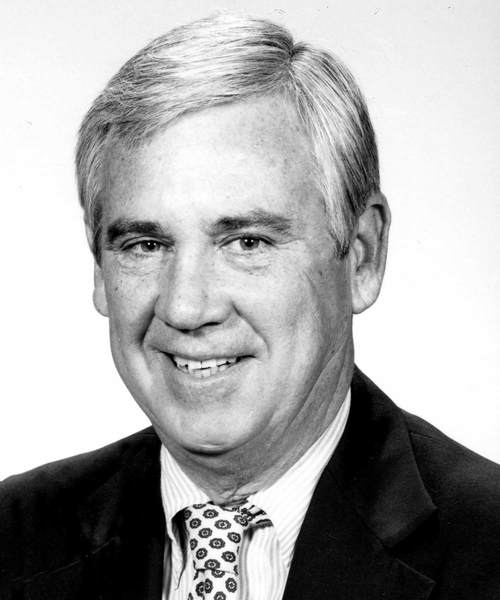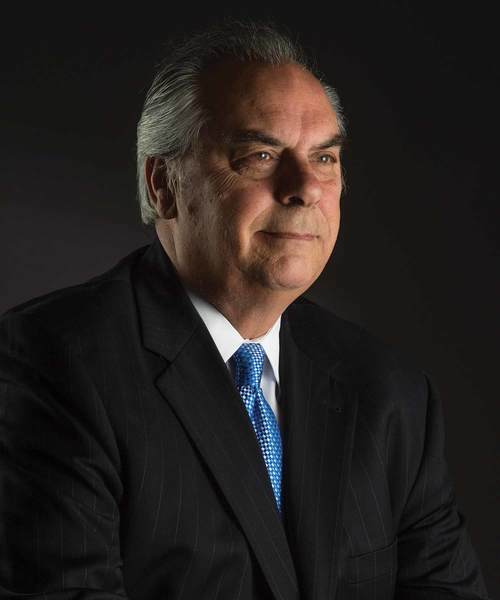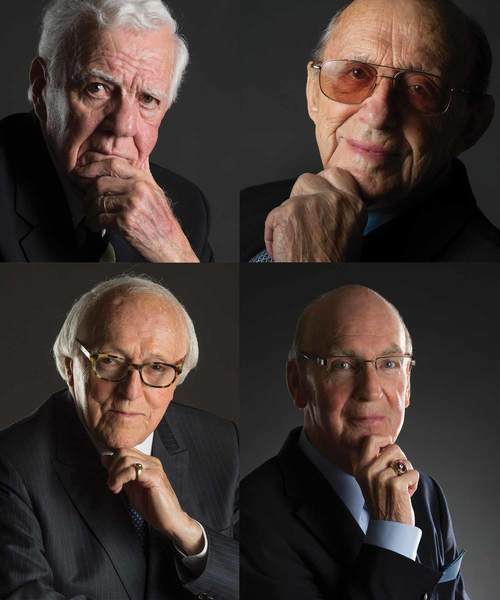
Gene Corrigan
Seeing the big picture
Gene and Lena Corrigan have been married for more than six decades. they have seven children, 19 grandchildren and four great-grandchildren.
And even though only six of those years were spent at the University of Notre Dame—nearly three decades ago—the former Irish athletic director still credits that comparatively short stay in South Bend as “the most important to the development of our family.”
Two sons—Boo (now the athletic director at the U.S. Military Academy) and Tim (coordinating producer of NBA telecasts at ESPN)—graduated from Notre Dame.
Another son, David (an attorney in Richmond, Virginia), received his law degree from the Notre Dame Law School.
A fourth son, Kevin, has been the Irish men’s lacrosse coach for 28 years. Three grandchildren—Maggie and Lena Zentgraf and Will Corrigan—played lacrosse and earned their bachelor’s degrees at Notre Dame. One grandson—Jack Corrigan—is currently an undergraduate.
“Although Boo was the only one who went to high school in South Bend, most of the other kids came and lived with us at least part of the time while we were there,” explains Corrigan, now a spry and energetic 88-year-old. “The culture of Notre Dame and what the place stands for had a very real impact on our family life. It’s really why I took the job.”
The devout Catholic, who grew up in Baltimore, almost said no to that 1980 offer to become the first new occupant of perhaps the most visible office in college athletics since 1949.
Corrigan was then in his 10th year as athletic director at the University of Virginia, when Notre Dame’s legendary athletic boss, Edward “Moose” Krause, announced his decision to retire. Rev. Edmund P. Joyce, C.S.C., then the University’s executive vice president and the man who oversaw athletics, called Corrigan, one of the most widely respected athletic directors in the country and at the top of Joyce’s very, very short list of replacement candidates.
“I certainly was intrigued and flattered, but taking the job would mean I would have to accept a huge cut in pay,” reflects Corrigan. “Remember, I had seven kids and the salaries in athletics then just weren’t what they are today. I had to convince Lena that coming to Notre Dame was the right thing to do for us and for our family.
“Once we got there, we felt at home—my staff was great, and I worked for two giants—Father Ted (Rev. Theodore M. Hesburgh, C.S.C.) and Father Ned. They were such great men, influential and respected all over the world. What a lucky guy I was.”
Even Lena, who wasn’t sure her Southern soul could embrace those bleak, Arctic-like South Bend winters, looks back fondly on their days in Indiana.
“It’s so hard to believe we left almost 30 years ago,” she says. Such fun, such good friends. “Gene’s staff really was a family, and everyone at the University just embraced us with their warmth.”
Most Notre Dame fans remember Corrigan as the man who hired Lou Holtz. But Corrigan’s other key hire was Irish women’s basketball coach Muffet McGraw, who led Notre Dame to the 2001 national championship as well as to six other NCAA Final Fours. Inducted into the Women’s Basketball Hall of Fame in 2011, McGraw recently notched her 700th win with the Irish.
“Gene Corrigan has been a trailblazer in college athletics for his entire career,” said McGraw. “As athletics director at Notre Dame and later, commissioner of the ACC, he was a leader who inspired people to be their best and was committed to excellence in everything he did. He was a huge supporter of women’s athletics, and I will always be grateful to him for bringing me to Notre Dame.”
Ironically, Corrigan wasn’t around to celebrate when his two key coaching selections won national titles with the Irish.
Just as the 1952 graduate of Duke University had to be persuaded to come to Notre Dame, Corrigan also had to have his arm twisted more than once to leave South Bend and return to the Atlantic Coast Conference as its commissioner in 1987 after the death of his friend Bob James, the man who had held the job for 16 years.
“We weren’t looking to leave,” says Corrigan, who had spent two years in the conference office in the late ’60s as its first full-time service bureau director, handling duties with officials and investigations. “But the
ACC kept raising the ante, and being the commissioner would give me an opportunity to be a bit more creative and have more of an impact on college athletics overall.”
And, what a force he was and continues to be. Corrigan’s handprint remains visible on almost every aspect of college athletics—from the creation of a football bowl playoff series to conference restructuring to the tremendous income increase from television rights’ fees.
“We miss Gene’s voice at the table,” says Rick Chryst, a 1983 Notre Dame graduate who now serves as senior vice president/of counsel at Dietz Sports and Entertainment. “He possesses a truly unique wiring. Gene never lost sight of the end game. College athletics is still about young people—it’s still about providing opportunities to compete at that elite level while embracing academics. Gene could always keep college athletics in perspective and articulate that vision.”
Chryst played baseball for the Irish when Corrigan was the Notre Dame athletic director. After graduating from the Duke University School of Law in 1989, he served as assistant commissioner of the Southwest Conference before Corrigan brought him to Greensboro as the assistant commissioner of the ACC.
“During Gene’s own career, he had occupied just about every job imaginable in an athletic department—from coaching to administration. He truly understood and appreciated what people did and why they did it,” explained Chryst. “To Gene, it was all about the people he worked with.
“Gene also was not afraid to engage people—he believed that if you got all the great thinkers in a room and let them go at it, you’d get to a better place. What’s that old Irish saying? ‘Irish diplomacy is the ability to tell a man to go to hell so that he looks forward to making the trip.’ That was Gene.”
When Corrigan arrived at the ACC, considered by most observers as the best college basketball league in the country, he immediately set his sights on improving the conference’s football presence because that was the sport that would elevate the group’s voice and impact on the national landscape.
“The day before I begin my job at the ACC—the weekend before football started—I pick up the Greensboro (North Carolina) Sunday newspaper, and there’s a two-page article about Dean Smith (then the head men’s basketball coach at the University of North Carolina) and his recruiting class,” remembers Corrigan. “So, at my first meeting the next day, I said, ‘We need to worry about football.’”
Over the course of the next few years, Corrigan transformed the profile of ACC football and ultimately, college football. To make a long story short, the conference added Florida State as a league member in 1991 (and the Seminoles won their first national championship in 1993), immediately enhancing the ACC’s football status. Under Corrigan’s watch, the conference moved into the major bowl mix as well. Corrigan and his staff, which included the late Tom Mickle, associate conference commissioner, and Chryst, helped devise the template that would create the bowl coalition and ultimately the Bowl Championship Series.
“In trying to find a place for the ACC in the bowls, we figured out a way to get the ball rolling on creating a plan to have number one play number two,” explains Corrigan. “Everybody had been complaining about the bowl system for years—we just got everybody on board and tried to create a better system to determine a national champion in football.”
The Bowl Coalition began in 1992, which morphed into the Bowl Alliance in 1995. The Rose Bowl agreed to join the mix in 1998—creating the Bowl Championship Series. Corrigan’s vision, leadership and integrity helped bring those with differing opinions and interests together to work toward a common goal. On Monday, January 11, 2016, when the top two teams meet in the second College Football Playoff championship game, Corrigan’s imprint will be noticeable.
But Corrigan’s legacy includes much more than football. While at Notre Dame, he revamped the Irish Olympic sports programs by providing more funding, elevating coaches to full-time status, building better facilities and creating more scholarships for student-athletes. Many of those teams now regularly compete for national titles.
Corrigan also helped shape intercollegiate athletic policy as a member of the NCAA Council and Executive Committee. He also served on the NCAA Men’s Basketball Committee, chaired the Division I Men’s Lacrosse Committee and was president of the United States Lacrosse Coaches Association. During his final two years as ACC commissioner (he retired in 1997), he was president of the NCAA.
Before Notre Dame had officially announced Corrigan’s appointment, outgoing athletic director Moose Krause told The Observer, “The advice I would have is that he (the new athletic director) better be a businessman. In the sports world, at the collegiate level, they’re going to have to think about ways to bring in revenue to support expanding programs. Many schools are in financial trouble right now.” That quote appeared in an Oct. 11, 1980, edition.
Ironically, almost 35 years later, Corrigan’s words of wisdom to aspiring athletics directors sound eerily similar.
“You’ve got to have an MBA or at least a major in finance because an athletic director’s job these days is centered on raising money,” explains Corrigan. “The money in college athletics is just huge, and it’s become more of a business. But that doesn’t mean college athletics can’t still provide an opportunity for young people to get an education. That model can still work.”
Now living in Charlottesville, the Corrigans are almost always on the go. And they still make it back to South Bend every once in awhile, to watch son Kevin’s Irish lacrosse teams in the spring.
“Whenever we came back, we’d visit with Father Hesburgh,” says Corrigan. “What an extraordinary man. What an honor it was to work for him. We miss him.”
College athletics may never see the likes of a Gene Corrigan again—he worked his way up the ladder the old-fashioned way. He coached soccer, lacrosse and basketball and taught physical education. He was a sports information director and supervised officials. He did everything but wash the uniforms and tape ankles. Those experiences helped hone his empathy and perspective as well as his collegiality. Corrigan loved people, and people loved him.
“I was born at the right time,” says Corrigan. “Lena and I had such a great time working in college athletics. It sure was a lot of fun.”

